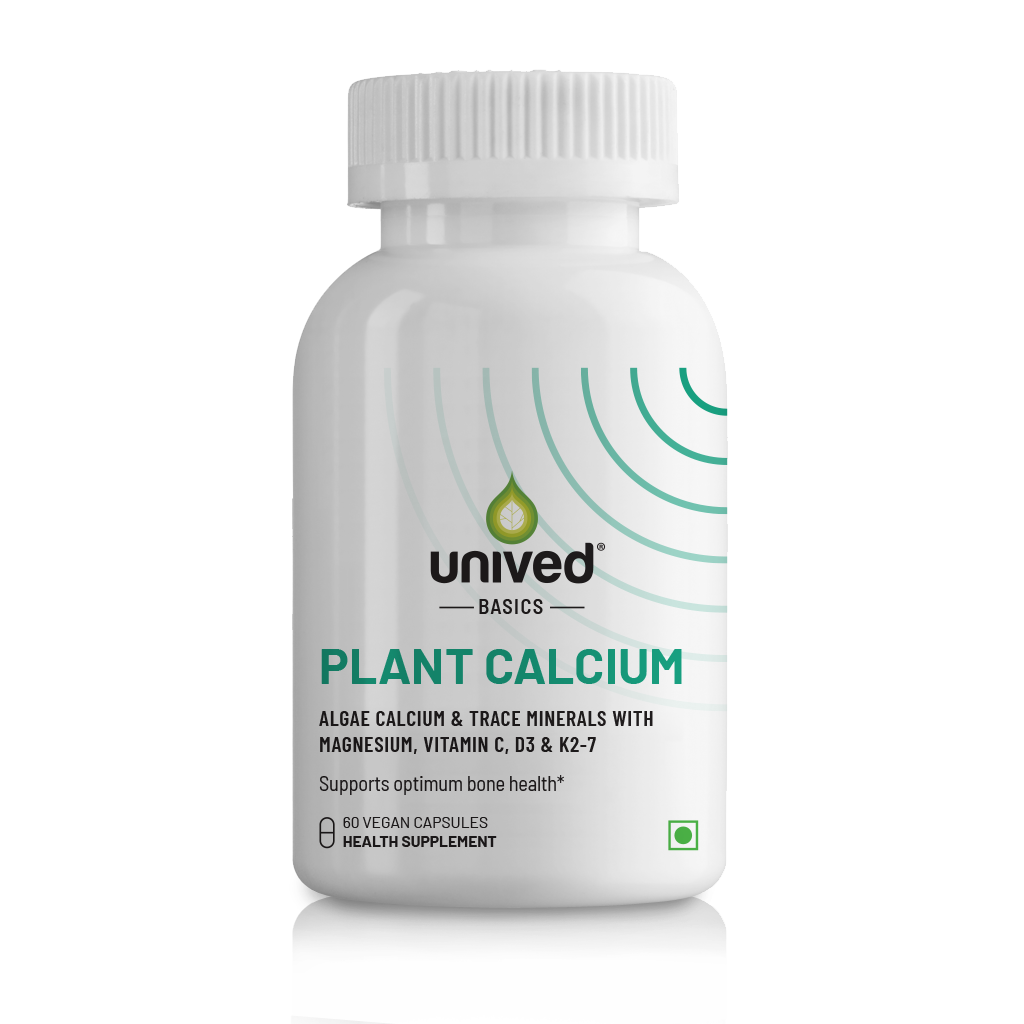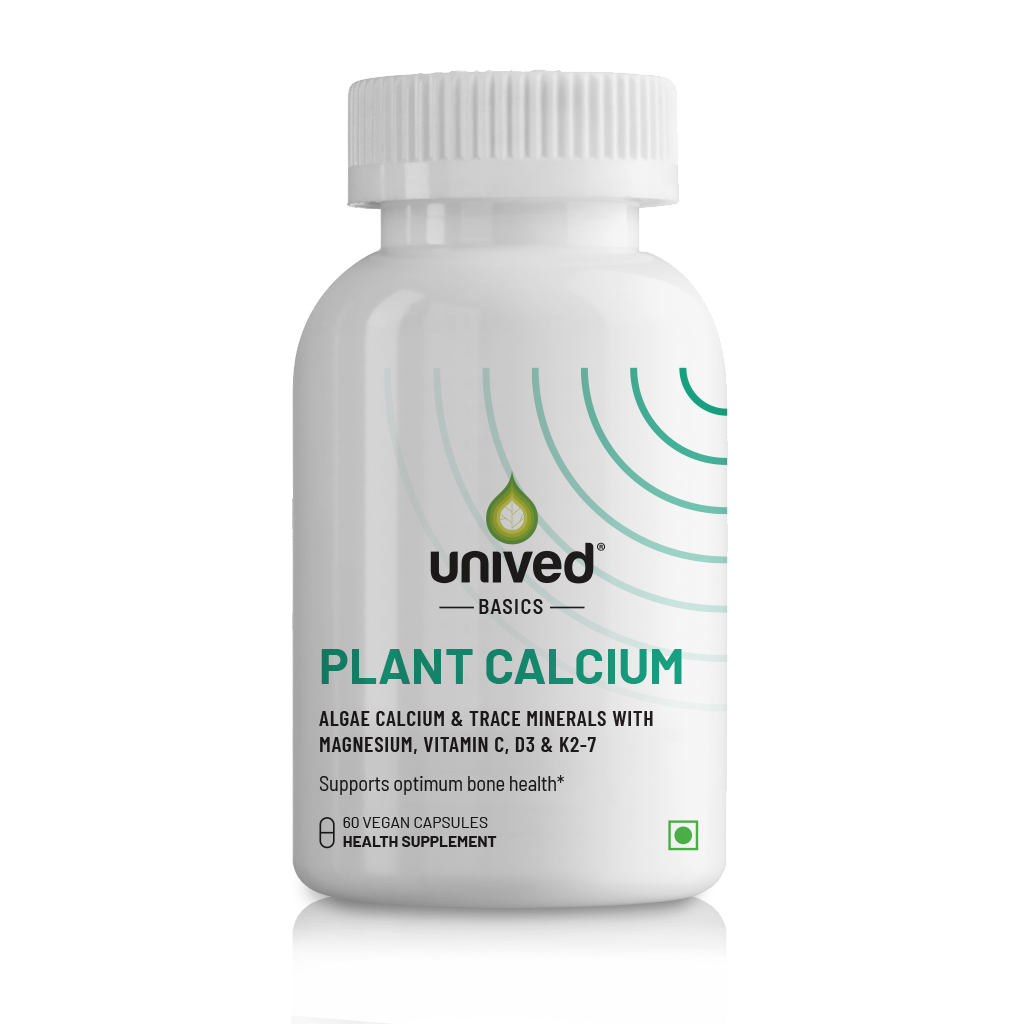Bone Health
Basics Plant Calcium
Basics Plant Calcium
Couldn't load pickup availability
Key Benefits
- Plant-derived ingredients.
- 100% Vegan.
- Synergistic formulation.
- Bioavailable.
- Optimal bone health support.
- Healthy bone aging.
Batch Details
Serving Size & Servings Per Container
Suggested Use
Certificate Of Analysis




- Learn More
- Ingredients
- FAQ
Calcium is of paramount importance for so many functions in
human health like building strong bones, and teeth, aiding muscle contraction,
oocyte activation, blood clotting, nerve impulse transmission, regulating
heartbeat, and fluid balance within cells. More than 99% of the calcium in the
human body is in the bones and teeth. In bone, calcium provides the structural
strength that allows the bone to support the body’s weight and anchor the
muscles [2]. Only 1% is found in serum. The serum calcium level is tightly
monitored to remain within normal range by a complex metabolic process. Calcium
metabolism involves other nutrients including protein, vitamin D, and
phosphorus. Adequate calcium intake from childhood to the end of the life span
is critical for health. Adequate and optimal intakes of calcium and vitamin D
potentiate multiple benefits. Research has shown that adequate calcium intake
can reduce the risk of fractures, osteoporosis, and diabetes in some
populations [3].
Calcium must be ingested daily and absorbed effectively in
order to maintain optimal health. Most people can get enough calcium by eating
a variety of foods rich in calcium. Foods that naturally contain calcium
include milk and other dairy products; green, leafy vegetables; seafood, nuts,
dried beans, and other fortified food products.
High dietary calcium intake is necessary for infants,
children, and adolescents in order to promote bone growth and formation.
Pregnant women also have higher calcium needs, because it is required for the
normal development of fetal bones. In addition, women who have reached
menopause need to ensure an adequate amount of calcium intake to reduce the
risk of osteoporosis [1].
Calcium deficiency can occur through an inadequate calcium
intake, which can lead to depleted calcium stores in the bones thereby leading
to weakened bones, arthritis, and osteoporosis. It can also occur when there is
a low level of calcium in the blood (hypocalcemia) which is usually a result of
a vitamin D or magnesium deficiency, impaired parathyroid hormone (PTH)
production (hypoparathyroidism), impaired bone resorption of calcium, critical
illness, or use of certain medications such as diuretics; medical treatments;
or disease processes, such as renal failure [4]. Whenever there is calcium insufficiency, bone
calcium which serves as a reservoir is tapped to maintain extracellular calcium
concentration. Thus, the effects of calcium deficiency may escape notice for a
considerable time until they manifest as skeletal weakness or fractures.
Our Formulation
Calcium supplements are always an option for maintaining
optimal bone health. However, calcium supplements can cause constipation and
should be balanced with proper magnesium consumption. We also need proper
levels of Vitamin D in our body in order to absorb calcium.
Unived Basics Plant Calcium consists of plant-based calcium
(500mg) derived from Algae with other supporting nutrients like Magnesium
(53mg), Vitamin D3 (400 I.U.), Vitamin K2 (50mcg), and trace minerals which
ensures that calcium is absorbed effectively in the body and gives additional
support to bone health.
Mode of Action:
- Provide structural integrity to the bones.
- Helps muscle contraction.
- Transmits nerve impulses.
- Maintains fluid balance within cells.
- Vitamin K2 helps in the reduction of arterial calcification
and directs Calcium where it belongs. Helps maintain strong bones, supports
cardiovascular health, and relieves muscle cramps. - Vitamin D3 aids in calcium absorption.
- Magnesium works closely with calcium in maintaining healthy
bones and increasing bone density.
References:
1. Cormick, Gabriela, and Jose M. Belizán. "Calcium
intake and health." Nutrients 11.7 (2019): 1606.
2. Power, Michael L., et al. "The role of calcium in
health and disease." American journal of obstetrics and gynecology 181.6
(1999): 1560-1569.
3. Beto, Judith A. "The role of calcium in human
aging." Clinical nutrition research 4.1 (2015): 1-8.
4. Pravina, Pieste, Didwagh Sayaji, and Mokashi
Avinash. "Calcium and its role in the human body." International
Journal of Research in Pharmaceutical and Biomedical Sciences 4.2 (2013):
659-668.
Active Ingredients per Serving (2 Capsules - 1.76g)
- Algae Calcium (from - Algas calcareas) – 1.56g
- Magnesium Citrate – 135mg
- Vitamin C (Ascorbic acid) – 40mg
- MenaquinGold (Vitamin K2-7 as MK-7 from fermented Chickpeas) – 20mg
- Vitashine™ (Vitamin D3 as Cholecalciferol from Lichen) 600 I.U. – 6mg
Other Ingredient - HPMC Vegetarian Capsule.
What is the suggested intake of Unived Basics Plant Calcium?
Adults take two capsules daily post-meal.
Do any medicines or other supplements interfere with Calcium absorption?
Medicines like antibiotics or blood pressure medicines may interfere with Calcium absorption. Iron supplements are also known to interfere or compete with Calcium for absorption. Please talk to your healthcare practitioner before taking Calcium supplements if you are already on any other medicines.





